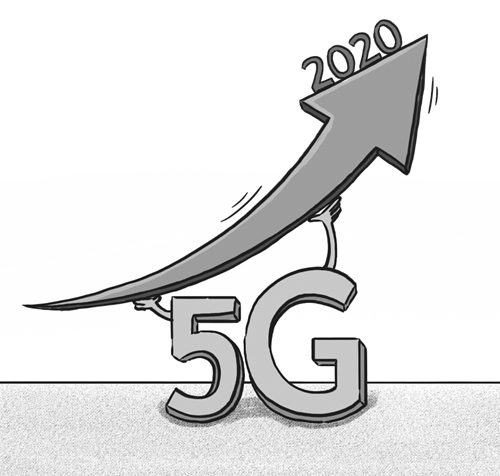HOME >> SOURCE
New technology, infrastructure investments to buoy up 2020 economy
By Wen Sheng Source:Global Times Published: 2019/12/22 20:08:11

Illustration: Xia Qing/GT
With 2019 rapidly coming to an end, Chinese people are gauging the economic prospects for 2020. Whether the whipsaw of the bruising trade war with the US will wind down and stop remains unknown, it is imperative for China to shore up its fundamentals in the new year if the world's second largest economy wants to avert big bumps.Macro policies have always played a peculiarly important role in preventing the economy from a hard landing in the past 40 years, and in 2020, Beijing is expected to utilize its multiple macro policy tools to make sure the economy grows at an annualized 6 percent growth rate.
Domestic spending power and infrastructure investment will continue to be the two prime catalysts for driving up the economy and cushioning it from a precipitous fall. China's retail sales in November, which attained an 8 percent growth, are indicative of the strong spending ability of Chinese consumers. At the same time, the government is investing tens of billions on expressways, tunnels, high-speed railways and sprawling cities throughout the nation.
In 2020, the decision-makers in Beijing are anticipated to significantly increase investment into two other spheres - basic sciences and technological innovations, as well as fortifying financial systems. The two bastions, if substantially firmed up, will help China to gain a much-needed competitiveness and become a fairly modernized economy.
Thanks to the marked achievements in telecommunications and information technology innovations, China now boasts one of the world's most advanced and ubiquitous internet, with its digitalization level envied and adored by many. Alibaba, Tencent, Baidu and Meituan Dianping are gigantic international internet businesses, and Didi Chuxing and Ant Financial belong to global unicorn frontrunners. Together, these companies have generated huge fortunes while creating millions of jobs.
Next year, China's three telecom carriers will compete to launch various forms of 5G businesses. Meanwhile, government and corporate investment in semiconductor innovations, including flash memory chips, advanced artificial intelligence and cloud computing chips, will go up momentously. It is almost certain that completely new business models of great efficiency will pop up.
At the same time, China is expected to expand its green technology utilization by erecting more wind turbines and solar panels, and turning out more electric battery cars, buses and utility vehicles. More nuclear power plants will also be built. An economy fired up by dirty fossil fuels, which poisons the air and drinking water, is contradictory of what the country aspires to be.
In regards to fortifying the financial system, the authorities are expected to introduce a relatively stable monetary policy, guaranteeing sufficient market liquidity, and resolutely opening up its financial services sector to foreign investors and global banks. Only when China's stock market, bond market and other financial markets are fully integrated with the international market, China's official currency, the yuan, will gain global clout, and the risk faced by its financial sector will recede.
Of course, in the new year, China's central bank and other financial regulators will implement more routine pressure tests on those "too-big-to-fail" mega lenders, insurance companies and investment banks. Simultaneously, deficit ridden small banks need to be restructured and replenished with funds. Default of one or two small lenders is unlikely to undercut financial system viability.
After all, China's economy is getting more tenacious after going through a 18-month long trade tussle with the US. The trade war has been a pressure test at an unprecedented level for a major economy as large as China.
Forced by the US government's coercive policies, China has diversified its foreign trade and investment avenues, and, China's domestic market appetite for overseas goods and services has kept growing. Nowadays, in the lens of many partner economies, China's huge and rising market is hard to resist. And, Beijing has just made clear it will unswervingly adhere to the opening-up policy.
Under the navigation of Chinese top leadership, China's economy did not wither in 2019, but has gained new strength in multiple technological explorations. The epoch-making "Belt and Road" Initiative has won the country more staunch friends and partners throughout the world.
The author is an editor with the Global Times. bizopinion@globaltimes.com.cn
Posted in: COLUMNISTS